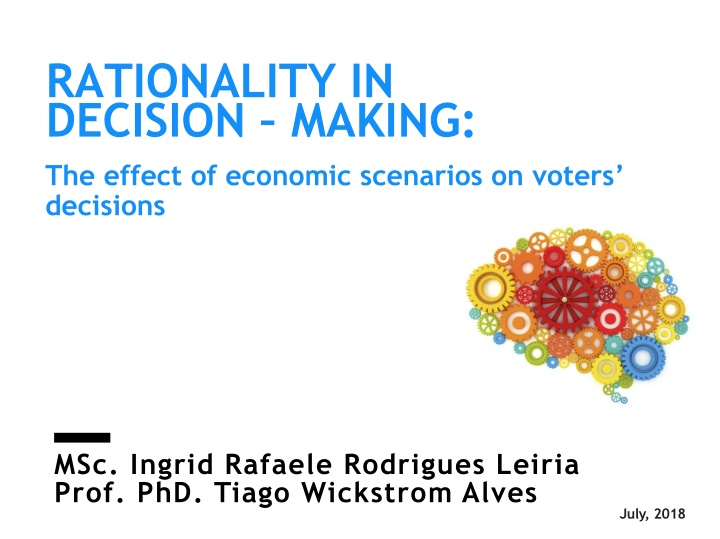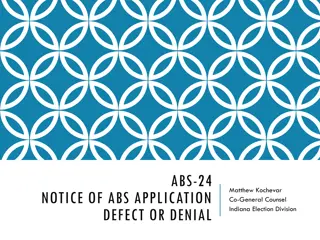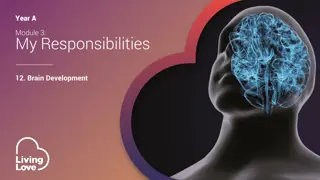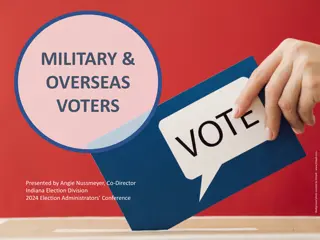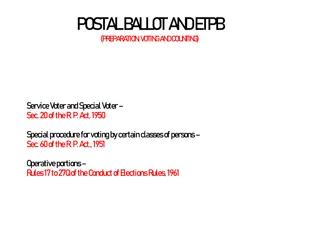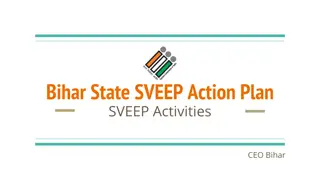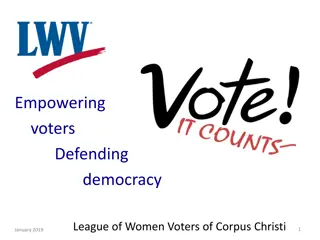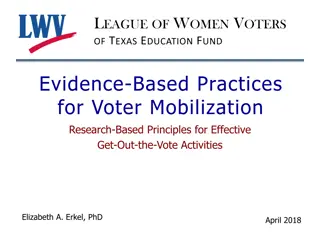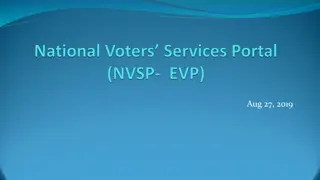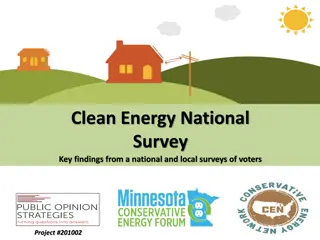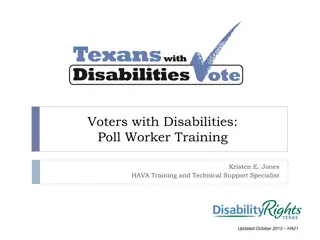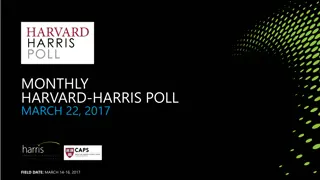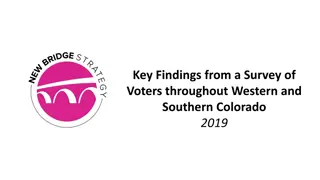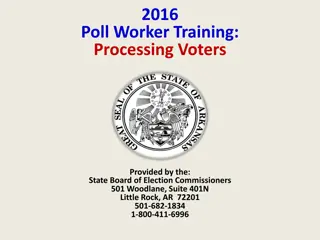Analyzing Economic Scenarios' Impact on Voters' Decision Making
This research explores how economic scenarios influence voters' decisions in a presidential election. It delves into the rationality assumptions in decision making, cognitive biases, and behavioral economics. Using experimental methodology, the study aims to uncover how voters weigh costs and benefits and whether heuristics play a role in their choices.
Download Presentation

Please find below an Image/Link to download the presentation.
The content on the website is provided AS IS for your information and personal use only. It may not be sold, licensed, or shared on other websites without obtaining consent from the author.If you encounter any issues during the download, it is possible that the publisher has removed the file from their server.
You are allowed to download the files provided on this website for personal or commercial use, subject to the condition that they are used lawfully. All files are the property of their respective owners.
The content on the website is provided AS IS for your information and personal use only. It may not be sold, licensed, or shared on other websites without obtaining consent from the author.
E N D
Presentation Transcript
RATIONALITY IN DECISION MAKING: The effect of economic scenarios on voters decisions MSc. Ingrid Rafaele Rodrigues Leiria Prof. PhD. Tiago Wickstrom Alves July, 2018
SUMMARY OBJECTIVE PROBLEM JUSTIFICATION MAIN DISCUSSIONS METHODOLOGY RESULTS ANALYSES FINAL CONSIDERATIONS
OBJECTIVE Analyze the political and economic assumptions of rationality making in order to verify by the method the economic scenarios on the voting decisions of voters in a presidential election. in decision experimental impact of
SUMMARY OBJECTIVE PROBLEM JUSTIFICATION MAIN DISCUSSIONS METHODOLOGY RESULTS ANALYSES FINAL CONSIDERATIONS
PROBLEM People, in the most part, do not make decisions taking into account all the costs and benefits of their choices. Relevance about decision making: Loss heuristics (shortcuts). bias presence aversion in and Do economic scenarios have influence on voters decision to choose a presidential candidate?
SUMMARY OBJECTIVE PROBLEM JUSTIFICATION MAIN DISCUSSIONS METHODOLOGY RESULTS ANALYSES FINAL CONSIDERATIONS
JUSTIFICATION Use of experiments to analyze the results of economic phenomena; Use of cognitive biases to benefit the political area beyond economic. Benefit through insights of behavioral economics; Need to enrich the basic model of rational choice, with premises coming from psychology and political sciences.
SUMMARY OBJECTIVE PROBLEM JUSTIFICATION MAIN DISCUSSIONS METHODOLOGY RESULTS ANALYSES FINAL CONSIDERATIONS
MAIN DISCUSSIONS H O M O E C O N O M I C U S R A C I O N A L I T Y B E H A V I O U R A L E C O N O M I C S E X P E R I M E N TA L M E T H O D
HIPOTHESIS 1.Through the analysis of an unfavorable economic scenario, the voters will choose the proposition to avoid losses; 2.The presence of heuristics in decision- making: the decision-maker in deciding to decide quickly, suffers the influence of shortcuts, making better decisions in a short time of analysis; 3.Decision makers will be more critical in their decision-making as they have more information.
SUMMARY OBJECTIVE PROBLEM JUSTIFICATION MAIN DISCUSSIONS METHODOLOGY RESULTS ANALYSES FINAL CONSIDERATIONS
METHODOLOGY Economic experiments applied in Political Sciences: Based on decision-making in an election; Alternatives are already clear and in limited numbers; These alternatives, predetermined as the candidates, ENDEAVOR to get the votes of the voters.
METHODOLOGY 1.Submission committee of the University in the case of an economic experiment; of the work to the ethics and research 2.Realization of the Protocol of the Experiment; 3.Selection of the participants: Undergraduate students of the School of Management and Business of the University; 4.Candidates: Economics; Undergraduate students or Masters of 5.Sessions: Taken in classes with the prior authorization of teachers.
METHODOLOGY PROCEDURES: PROPOSITION: Procedure 1: No option of communication between students and candidate for questioning; Proposition 1: Optimistic Proposition 2: Pessimistic Procedure 2: With the option of communication between students, without option of communication between students and candidates; Procedure 3: With the option of communication between students and candidates.
SUMMARY OBJECTIVE PROBLEM JUSTIFICATION MAIN DISCUSSIONS METHODOLOGY RESULTS ANALYSES FINAL CONSIDERATIONS
RESULTS ANALYSES For data analysis, it was considered: The experiment was carried out with: 20 Classes; 434 Students 21 Classes; 446 Students; 10 different candidates; Throughout the month of September and October 2015.
RESULTS ANALYSES Confidence Interval of Proposition - 5% significance Proposition1: 0,3679 0,4631 0,5582 Proposition 2: 0,4301 0,5265 0,6228 Proposition with the highest concentration of votes: Proposition 2 with 52.65%. There is a possibility that the values could cross and haveareversalofthewinningproposition.
RESULTS ANALYSES Synthesis: concentration of votes; Proposition 2 (pessimistic): obtained the highest Influence of shortcuts; The higher the level of communication between voters and candidates, the more likely it is for people to make more rational decisions.
SUMMARY OBJECTIVE PROBLEM JUSTIFICATION MAIN DISCUSSIONS METHODOLOGY RESULTS ANALYSES FINAL CONSIDERATIONS
FINAL CONSIDERATIONS Expected sample (300 participants) Obtained sample (446 participants); Help of different volunteer candidates; Difference of concentration of votes between genders; Difference of votes concentration in relation with the different procedures: Procedure 1 Procedure 2 Procedure 3
FINAL CONSIDERATIONS POSSIBLE FUTURE DISCUSSIONS Perform with different undergraduate courses; Perform with different levels of schooling; Apply the discussion in high school, to begin developing students' critical sense before entering the academic environment.
RATIONALITY IN DECISION MAKING: The effect of economic scenarios on voters decisions MSc. Ingrid Rafaele Rodrigues Leiria ingridleiria@gmail.com Prof. PhD. Tiago Wickstrom Alves twa@unisinos.br Thank you! July, 2018
